Costs
1/61
There's no tags or description
Looks like no tags are added yet.
Name | Mastery | Learn | Test | Matching | Spaced |
|---|
No study sessions yet.
62 Terms
What does the term ‘costs’ include?
Solicitor’s charges, disbursements (i.e. court fees, expert’s fees), pre-action costs.
General rule = Unsuccessful party pays successful party’s costs.
When must a party file a costs budget?
Before case management conference.
Court may impose a costs management order.
What is the effect of a costs management order? What are the two types of CMOs?
Standard basis = Party recover amount of its last approved / agreed budgeted costs.
Court depart from this only if persuaded good reason to do so, if costs of a phase were:
Not incurred at all; or
Much less than budgeted.
Indemnity basis = Assessed by court in typical way at trial’s end.
Generally speaking, how are costs dealt with on the small claims, fast / intermediate and multi-tracks?
Small claims = Costs non-recoverable; costs payable limited to disbursements.
Fast / intermediate = Fixed costs
Multi-track = Detailed assessment of costs.
What are ‘fixed costs’?
CPR fixes amount recoverable from opponent.
Separate from arrangement between party and own legal team.
Advantage = Knew exactly how much in advance to pay.
Disadvantage = Successful party unlikely recover all costs; pay shortfall to solicitors.
Which tracks do fixed costs apply to?
Apply to all fast / intermediate tracks.
Reduce level of costs, certainty re amount and simplify process.
How do complexity bands affect the fixed recoverable costs?
Claim allocated to track; assigned complexity band.
Ascending scale. Determines amount recoverable.
Higher band of claim; later settlement reached = Higher costs payable.
Parties don’t require costs budget or costs assessments.
Need only select complexity band.
Can the parties make applications for costs greater than fixed recoverable costs?
Yes.
Ordered in ‘exceptional circumstances’.
Payment can also be reduced to winner or increased to loser for ‘unreasonable conduct’.
What is a summary assessment of costs?
Costs not fixed; summary assessment applies.
Court determines amount payable immediately at end of hearing.
Parties file statement of costs (do not confuse with ‘bills of costs’) 24-hours before interim hearing.
Risk to parties allowing judge solely decide.
Applies trial or hearing lasting 1-day.
What is a detailed assessment of costs?
Court cannot make summary assessment (i.e. insufficient time).
Multi-track uses this method.
Within 3-months of date of judgment; receiving party serve on paying party ‘Notice of Commencement’ (i.e. details of costs, receipts).
What happens if the paying party disputes the receiving party’s ‘Notice of Commencement’?
(A). Paying party has 21 days serve points of dispute.
(B). Receiving party has 21 days to file a reply.
(C). Receiving party files a request for assessment hearing within 3-months of expiry of period for commencing detailed assessment proceedings.
(D). If costs claimed <£75,000; court undertakes provisional assessment where judge decides what costs are allowable in parties’ absence.
(E). Either party unhappy with this, can request oral hearing within 21 days. But if fail achieve at least 20% adjustment in their favour must pay hearing costs.
Why? Discourage parties trying their luck to reduce costs.
What are interim hearings? What costs are typically awarded here?
Interim hearings = Summary judgment applications, set aside default judgment, strike out statement of case.
Judge decides costs summarily at end.
True or False: The judge’s role in multi-track claims to assess costs is greatly reduced by fixed costs.
False.
Judge must make detailed assessment of costs.
Fixed costs apply to fast / intermediate tracks.
CPR, r 44.4 assists with this.
What factors does the judge consider when deciding the amount of costs under multi-track claims?
CPR, r 44.4
(A). Parties’ conduct and efforts to resolve dispute.
(B). Value of money / property involved.
(C). Importance of matter to parties.
(D). Complexity of matter.
(E). Skill, effort, specialised knowledge and responsibility involved.
(F). Time spent on the case.
(G). Place / circumstances in which work done.
(H). Receiving party’s last approved budget.
NOTE - Must check on what basis ordered; either standard or indemnity.
What is the standard basis for costs?
Costs proportionate to matters in issue.
Proportionate if bear reasonable relationship to:
Sums in issue
Value of monetary relief
Litigation complexity
Additional work generated by paying party’s conduct.
Effect? Disproportionate costs disallowed even if reasonably incurred or reasonable in amount.
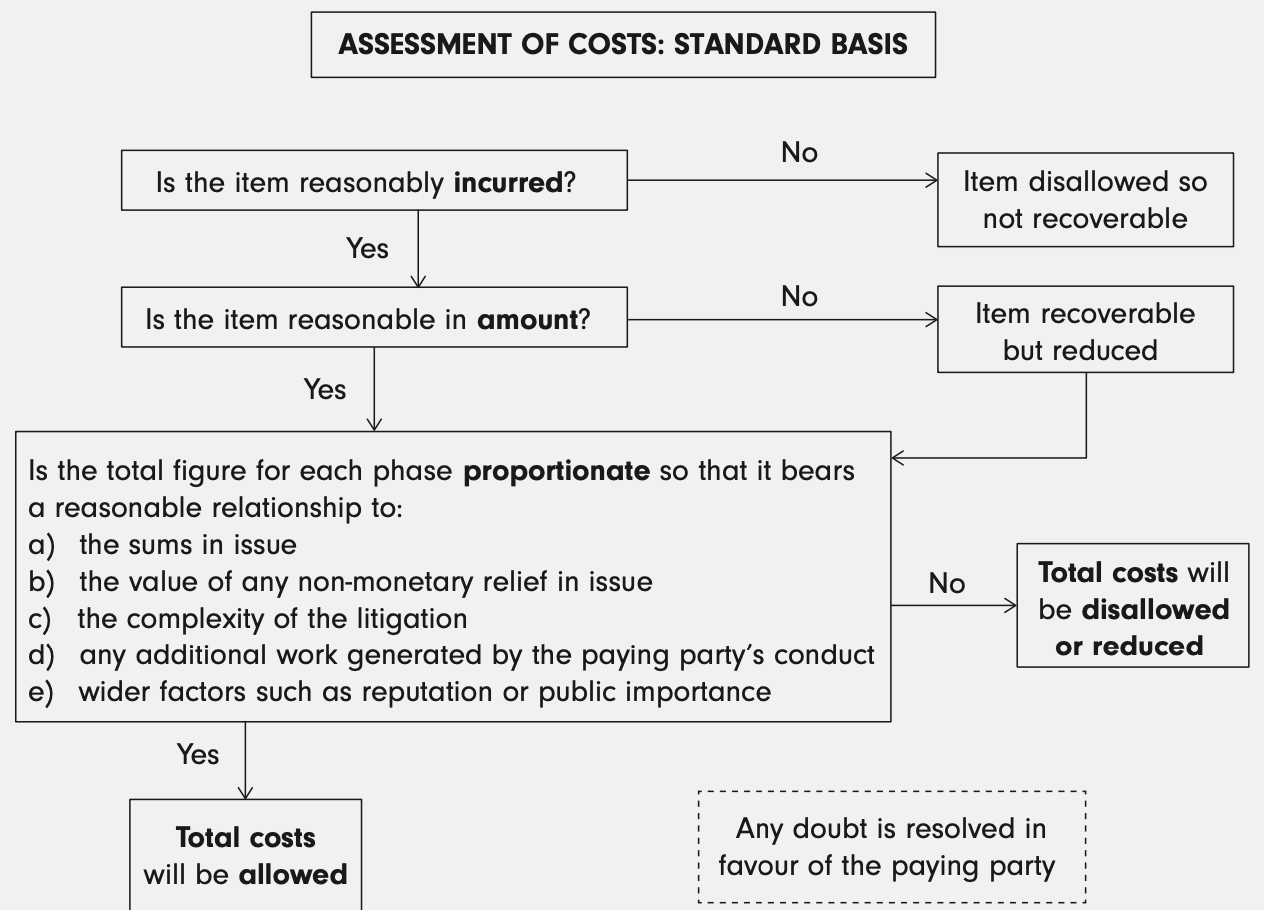
True or False: If there is any doubt as to costs on the standard basis it is resolved in favour of the paying party.
True.
What is the two-stage approach to determining costs on an indemnity basis?
Judge reads through bill. Scrutinises each line. Items unreasonably incurred or unreasonable amount disallowed.
Proportionality of overall figure assessed by reference to factors listed in Part 44.
Deemed proportionate; no further assessment.
If not, judge scrutinise categories of cost (i.e. disclosure, factual evidence). Decide if reduce further.
Resulting figure = Final amount costs assessment.
Expert A was hired by the CL to produce a report on their claim before proceedings commenced. The court did not grant the CL permission to rely upon this expert.
Is this cost reasonably incurred as per Stage 1?
No.
CL did not do anything wrong. Sensible to assess case merits.
But court did not grant permission.
The CL employed Expert B to draft a report and give evidence at trial. It cost £30,000. Referring to the factors under Part 44: value of money in dispute, issue complexity, degree specialised knowledge judge decided fee was too high.
What will happen under Stage 2 now that the judge has decided its disproportionate?
Costs reasonable to incur (Stage 1); granted permission.
But disproportionate under Part 44 factors. Reduce from £30,000 to £23,000.
CL pay shortfall of £7,000 to expert.
How does ‘May v Wavell’ highlight the forceful approach the courts take towards the two-stage costs test?
Private noise nuisance claim. Settled for £25,000.
May claim costs £200,000.
Judge applied Stage 1 (reduced to £100,000).
Applied Stage 2 (reduced to £35,000).
How are costs assessed on the indemnity basis?
Awarded as a penalty. Courts displeasure parties’ behaviour pre-action / during proceedings.
Costs must be:
Reasonably incurred; and
Reasonable in amount.
True or False: If there is any doubt as to costs on the indemnity basis it is resolved in favour of the receiving party.
True.
What are the two key differences between the standard and indemnity basis?
Standard uses proportionality test. Indemnity does not.
Doubts resolved in favour of receiving party on indemnity basis. Paying party on the standard basis.
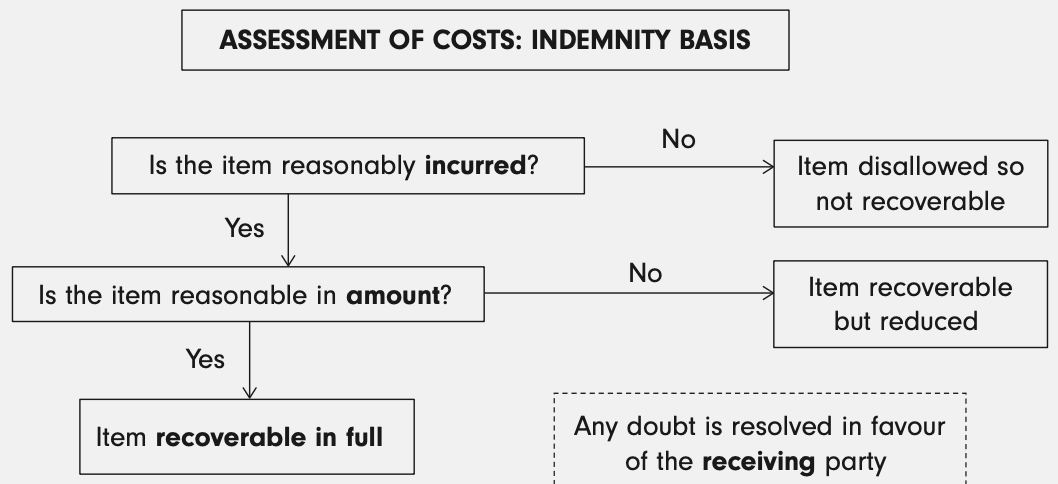
Does the court apply the reasonable / proportionate test on the standard basis if the budgeted costs are already agreed?
No.
If in CMO they are ‘locked in’ costs.
Do not apply the test.
‘It had been reasonable to instruct the expert who gave evidence at the trial but the costs judge doubted that their fee of £8,950 was reasonable. The costs judge considered £7,500 to be a reasonable fee’.
The claimant will have to pay the defendant’s expert’s fee of £7,500
True or False?
False.
Benefit of the doubt is given to the receiving party.
CL will pay £8950.
What is a non-party costs order?
Win case? What happens if losing party unable to pay costs?
Court discretionary power make order against non-party to pay costs.
Must be satisfied non-party is real party interested in litigation.
Non-party entered as party to proceedings; attend costs hearing.
Elgin Cars Ltd obtained judgment against Birmingham Gears for £165,000 for failure to supply goods. BG goes into liquidation after trial. Unable to pay costs order. EC applies for non-party costs order against John Smith (father of managing director of BG) who funded litigation.
Will this non-party costs order be successful?
No.
John had no interest in outcome other than personal (i.e. family).
Litigation Funders funded CL - Malvern Tech. MT was unsuccessful in their claim against the defendant. Defendant makes non-party costs order against LF.
Will this non-party costs order be successful?
Perhaps yes.
Court has discretion to order LF to pay.
Had an interest in the outcome.
Defendants are inherently vulnerable in the litigation process because proceedings are forced upon them and they may not recover all their costs.
What court order can they seek to offset this? What are the steps to the test?
Court order for ‘security of costs’ under Part 25.
Interim application. CL pays money into court.
Just to make order having regard to all the circumstances; and
One or more conditions applies.
NOTE - As with all interim applications; write to CL first before applying court order.
Just to make order having regard to all the circumstances; and
What factors do the courts assess under this limb?
(A). Strength of claim and defence - Less likely D succeed; less likely justified in receiving security.
(B). CL’s ability to provide security - Reasonable prospect of success; less likely award security. Could stifle claim. BOP on CL to show this. Sufficient assets? Court award security order.
(C). Cause of CL’s impecuniosity - CL may argue poor finances a result of D’s actions.
(D). Property within jurisdiction - CL resident outside EU. Court unlikely grant security if sufficient assets in UK available.
(E). Timing - Apply ASAiP.
NOTE - With (C) the D must show that CL will not be able to pay the costs.
One or more conditions applies.
What are the conditions that must apply?
CL resident outside 2005 Hague Convention State and England / Wales. Individuals (habitually live); companies (central management).
CL is an impecunious company. D show reason to believe CL unable pay D’s costs.
CL taken steps to make enforcement difficult (i.e. relocate to UAE). May use freezing injunction here.
What is the effect of reaching a settlement prior to the issue of proceedings and during proceedings?
Prior to litigation - CL not entitled recover legal costs unless agreed.
During litigation - Agree terms in consent order or Tomlin order.
Issue enforcement proceedings.
What is the significance of a Part 36 settlement offer? What happens if you reject one?
Prescribed means of settlement.
Significant penalties if reject it and court later decides ‘wrong decision’.
Puts pressure on opponent to consider.
What are the formalities for a Part 36 settlement offer?
(A). Be in writing
(B). Make clear it is a Part 36
(C). Specify 21 day period of acceptance. D will pay CL’s costs (i.e. ‘relevant period’).
(D). State if relate to whole claim or part of it. Whether counterclaim taken into account.
NOTE - Start of ‘relevant period’ is day after deemed service. Ordinary days. Not business days.
Revise interaction of deemed service and relevant period.
How is a Part 36 offer made to the opponent?
When it is served.
Rules of deemed service apply.
Inclusive of interest until relevant period expires.
Part 36 offers are treated as ‘without prejudice save as to costs’.
What does this mean?
Judge unaware of offer until liability and quantum decided.
True or False: A Part 36 offer may be withdrawn at any time during the 21-day acceptance period.
True.
BUT - Must serve ‘notice of change’ or ‘notice of withdrawal’. Otherwise Part 36 Offer still live and can be accepted in place of subsequent offers.
If the D makes an offer which is accepted by the CL within the relevant period - what is the effect of this?
D must pay CL within 14-days.
Fail to do so? CL enter judgment against D.
CL entitled to costs up until notice of acceptance is served on D.
Can’t agree? Judge assesses…
Standard basis in multi-track.
Fixed recoverable costs in fast / intermediate tracks.
If the CL makes an offer which is accepted by the D within the relevant period - what is the effect of this?
Same as above.
CL entitled to costs up to date of acceptance.
If the D makes an offer which is accepted by the CL after the relevant period - what is the effect of this?
Affects recovery of costs if parties disagree.
Judge will order:
D pays CL’s costs up to date of relevant period expiry; and
CL pays D’s costs thereafter until acceptance date.
If the CL makes an offer which is accepted by the D after the relevant period - what is the effect of this?
Affects recovery of costs if parties disagree.
Judge will order:
D ordered to pay CL’s costs of proceedings up to acceptance date.
Are proceedings ongoing as Part 36 payments are made?
No.
Proceedings are stayed.
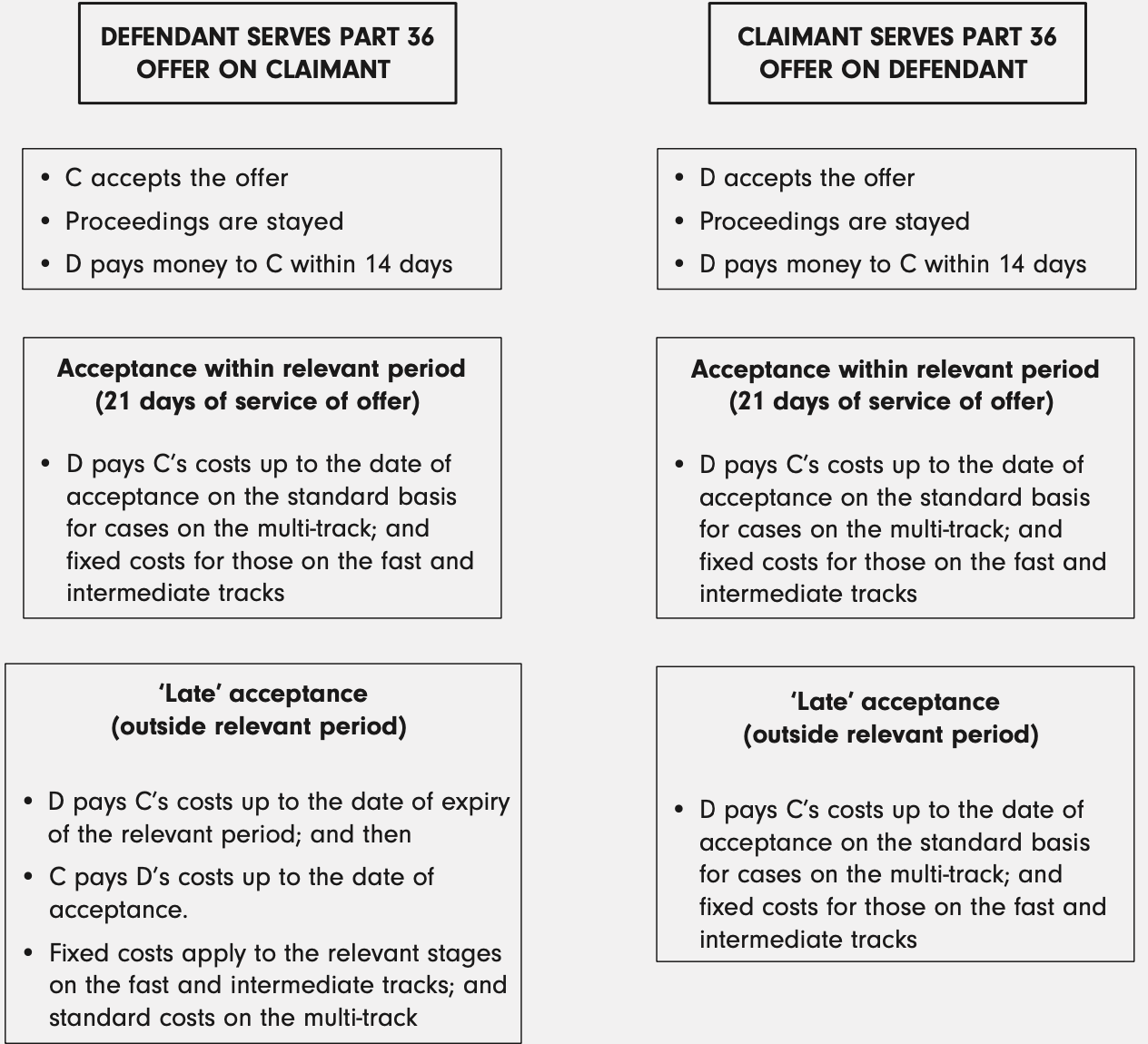
Where a judge determines that a party has rejected a valid Part 36 order:
When will the penalties be applied?
Will they apply automatically?
Penalties applied after relevant period (i.e. Day 22).
Apply automatically unless court rules it would be unjust to do so.
A court will apply penalties for a failure to accept a valid Part 36 offer unless it is unjust to do so.
When will it be unjust to do so?
Offeror fail provide sufficient disclosure allow offeree make informed decision.
Other factors accounted for: circumstances of case, terms of Part 36 offer, when it was made, how close to trial.
What are the possible outcomes at trial of a CL’s offer?
Three possible outcomes of Part 36 offer:
Win at trial. Awarded sum equals or beats own offer.
Win case. Obtain judgement less than offer.
Lose at trial.
Win at trial. Awarded sum equals or beats own offer.
What happens to the CL’s award of damages in this instance?
Great position. Get damages and penalties from D.
Damages up to £500K; D pay additional 10%.
Damages exceed £500K and up to £1M. 10% of first £500K is payable and thereafter 5% up to a maximum £75K.
Win at trial. Awarded sum equals or beats own offer.
What does the CL receive with regard to interest on damages in this instance?
Gains enhanced interest on damages.
10% above base rate is payable from Day 22 up to date of judgment.
Exceed typical 1% payable in commercial cases (i.e. date of breach up to serving of Part 36 offer).
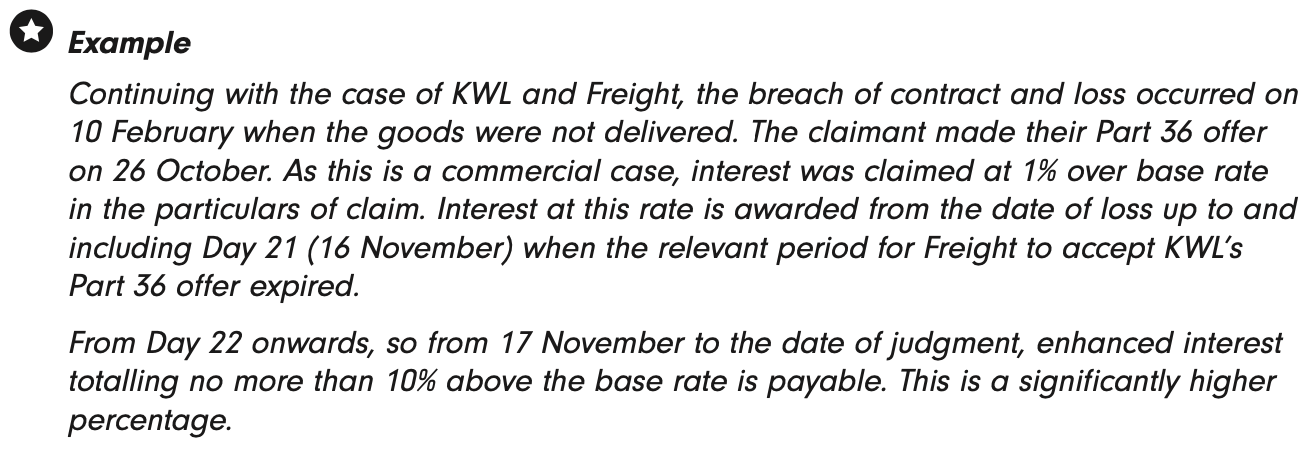
Win at trial. Awarded sum equals or beats own offer.
What does the CL receive with regard to costs on the multi-track?
Typical situation? D pay costs on standard basis from date incurred up until trial and judgment.
Part 36 changes this; pay on indemnity basis from Day 22 onwards.
Win at trial. Awarded sum equals or beats own offer.
What does the CL receive with regard to costs on the fast and intermediate tracks?
Typical situation? D pays fixed costs.
Part 36 changes this; pay 35% difference between fixed costs of applicable stage when Part 36 offer expired and stage applicable at judgment date.
Labelled ‘enhanced fixed costs’.
Not a straight uplift on all costs.
Win at trial. Awarded sum equals or beats own offer.
What does the CL receive with regard to interest on costs in this instance?
Interest awarded on indemnity / enhanced fixed costs.
May be 10% above base rate. Court decides.
Contrary to typical rule that interest not payable on costs incurred before judgment.
Runs from Day 22.
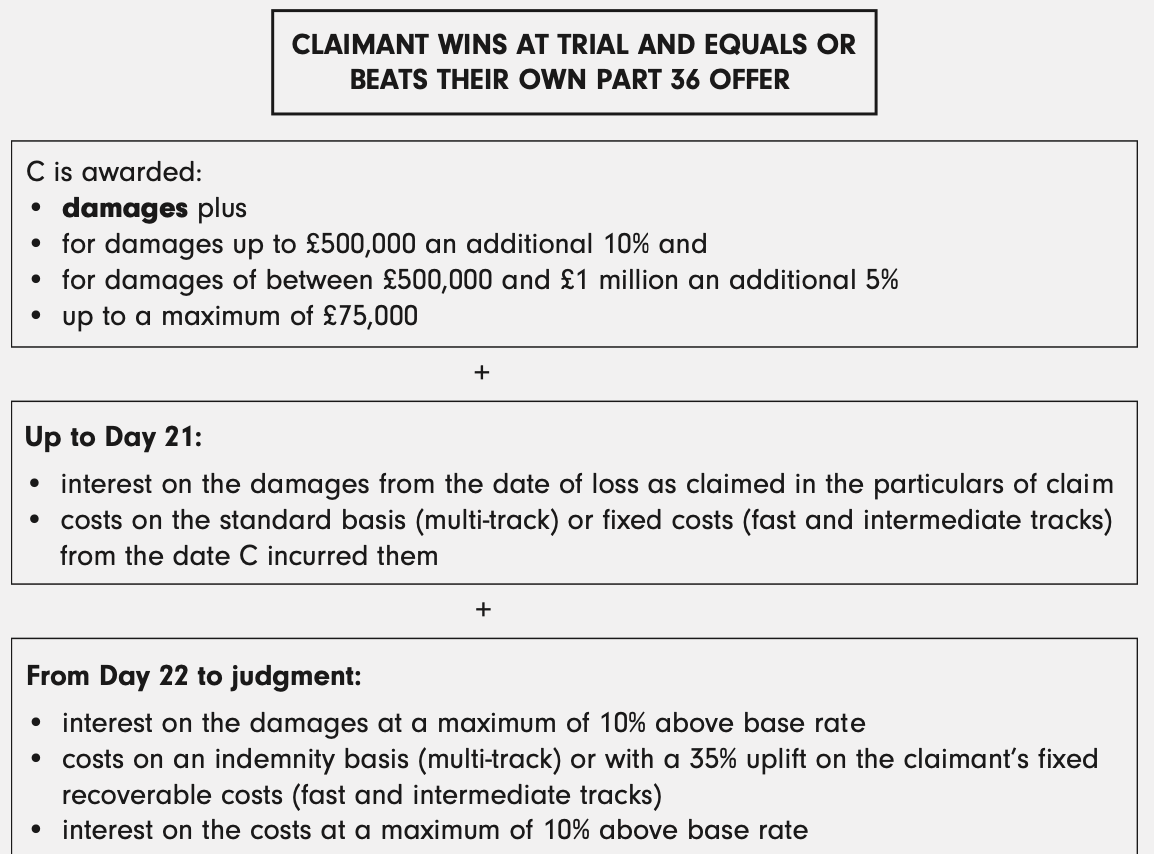
Win case. Obtain judgement less than offer.
What happens to the CL in this instance?
No extra penalty imposed; no one did anything wrong.
CL right to make offer. But pitched it too high. D correct to turn it down.

Lose at trial.
What happens to the CL in this instance?
CL not awarded damages at all; must pay D’s costs.
Standard basis - Multi-track
Fixed costs - fast / intermediate tracks.
What are the possible outcomes at trial of a D’s offer?
CL wins at trial and beats the D’s Part 36 offer.
CL wins at trial but fails to beat D’s Part 36 offer.
CL loses at trial
CL wins at trial and beats the D’s Part 36 offer.
What happens to the parties in this instance?
CL justified in refusing D’s initial offer because too low.
D ordered to pay:
Judgment amount plus interest under particulars of claim; and
CL’s costs on standard basis (multi-track) or fixed (fast and intermediate track).
CL wins at trial but fails to beat D’s Part 36 offer (i.e. equal or less than D’s Part 36 offer)
What happens to the parties in this instance?
CL proven to have wasted time and expenses of D.
Court orders a ‘split costs order’:
(A). D pays CL’s costs on standard / fixed costs (depends on track) from when costs incurred until relevant expiry (Day 21);
(B). CL then pays D’s costs on standard / fixed costs from date of expiry (Day 22) until judgment; plus
(C). CL pays interest on those costs (1-2% above base rate).
CL also liable for own costs from Day 22.
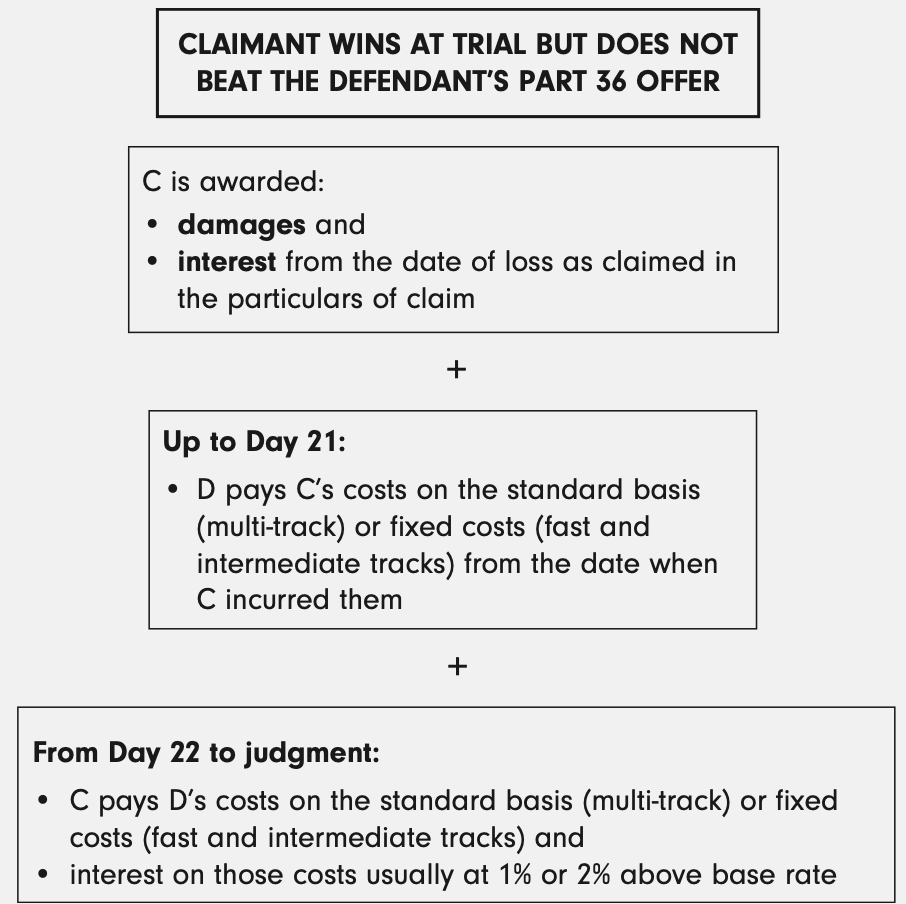
CL Loses at trial
What happens to the parties in this instance?
CL pays the ‘winner’s costs’ (i.e. D).
Judge imposes punishment because failed to accept Part 36 offer.
Pay interest on costs from Day 22 until judgment (1-2% above base rate).
Not as significant as if D refused Part 36 offer.
Can a CL apply for an interim costs order under Part 25 in any circumstances?
Yes.
Provided they are a defendant in some capacity (i.e. defending a counterclaim from the D).
What are ‘bills of costs’?
Prepared by receiving party at conclusion of case for detailed assessment
In what situations and by how much (i.e. % increase) can fixed recoverable costs be increased or decreased?
Party’s unreasonable behaviour - 50% (150% for CL if D unreasonable; 50% reduction if CL unreasonable)
Additional claimants on same set of facts - 25%
London weighting (i.e. live in London + hire London legal team) - 12.5%
What are the different functions regarding costs of the ‘trial judge’ and ‘costs judge’?
Trial judge determines a costs order.
Costs judge may determine amount payable at a detailed assessment.
True or False: You may seek a security for costs order in defending a claim, counterclaim and Part 20 additional claim.
True.
Applies to defendant of any claim.
What is a Part 20 additional claim?
Brings a 3rd party into an existing claim.
D uses to introduce new party to counterclaim against.
Seek contribution from 3rd party.
Seek indemnity from 3rd party.